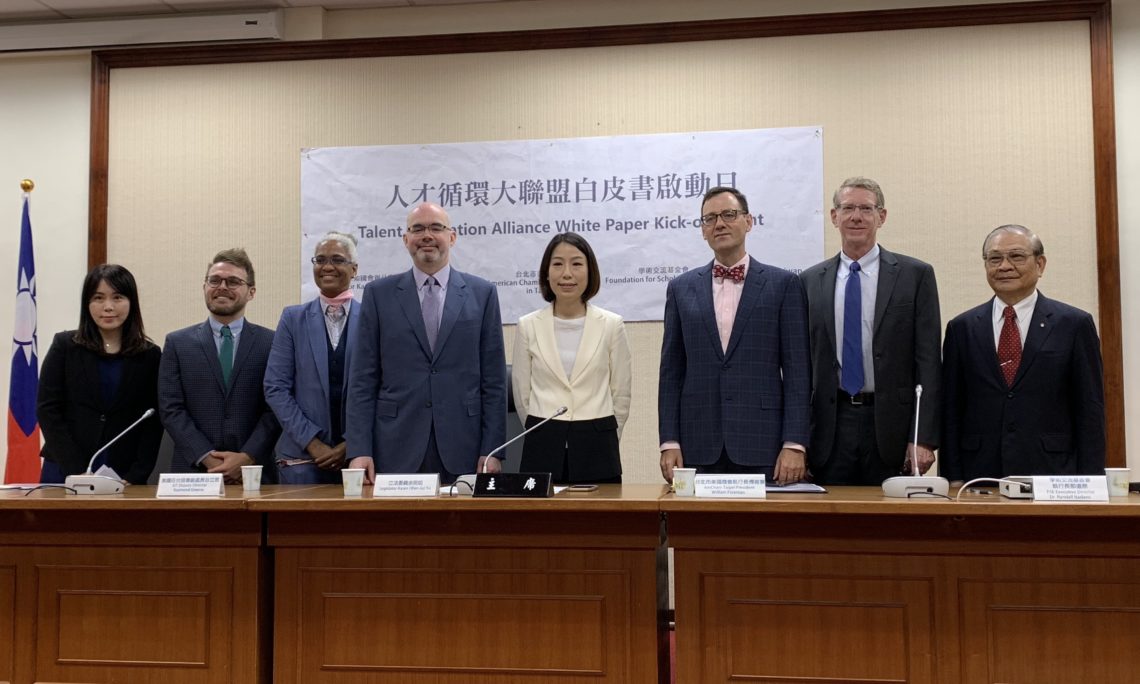OT-1962
August 26, 2019
Remarks by AIT Deputy Director Raymond Greene
at TCA White Paper Kickoff Event
at the Legislative Yuan
Monday, August 26, 2019
Legislator Yu, Foundation for Scholarly Exchange Executive Director Nadeau, AmCham President Foreman, distinguished guests, ladies and gentlemen, zao an!
Thank you all very much for coming, and thanks in particular to our good friend Legislator Karen Yu for hosting this kickoff event. You have been a steadfast partner with AIT on all things digital economy, women’s empowerment, and now Talent Circulation Alliance, and we appreciate your cooperation.
It is my great pleasure to be here today to help kickoff the Talent Circulation Alliance White Paper process.
The Talent Circulation Alliance, or TCA, is a joint venture between AIT, Taiwan’s government, in particular the Industrial Development Bureau, and the Foundation for Scholarly Exchange. It was first announced on April 16 at the U.S.-Taiwan Women’s Economic Empowerment Summit. The TCA is a public-private partnership that aims to facilitate the circulation of talent between Taiwan and other like-minded partners in order to cultivate a deep pool of capable, internationally-integrated, and digitally savvy professionals.
The goals of the TCA are clear:
First, we look to recreate the U.S.-Taiwan industrial story for the digital age: Much of Taiwan’s industry was fueled by those who studied or worked in the United States and came back and joined Taiwan’s top firms or founded their own companies. The TCA seeks to recreate this dynamic for future generations.
Second, talent circulation is a key solution to brain drain: We believe the best way to prevent the loss of talent is to create a viable alternative – namely circulation of talent among like-minded economies, including the United States. Brain drain is a zero-sum game between economies, whereas talent circulation is mutually beneficial for all concerned. The more that academic and professional exchanges occur, the more connective tissue will bind our economies together.
Third, we hope to grow Taiwan’s most important resource – its talent: We are all aware of the threat posed by the PRC to Taiwan’s traditional tech industries. This includes China’s market-distorting subsidies, theft of trade secrets, and poaching of talent including through their 31 measures. By both internationally circulating and professionally cultivating Taiwan’s talent, Taiwan can further reposition itself as an innovation-based, internationally connected economy.
Fourth, talent circulation will help Taiwan expand its international presence: While Taiwan’s formal diplomatic space may be constrained, expansive international professional exchanges and circulation in the private sector, academia, and international NGOs will enable Taiwan to expand its international presence and amplify its contribution to the world. The circulation of talent between Taiwan and other like-minded partners is the key to keeping Taiwan’s future firmly anchored in the free and open Indo-Pacific.
The purpose of the TCA White Paper is to work with all relevant stakeholders to identify the administrative, regulatory, and legal obstacles to the circulation and cultivation of talent, as well as to propose positive steps which can be taken to accomplish TCA goals. The TCA White Paper will become a dedicated section in AmCham’s influential annual White Paper published in the late Spring.
As you will see during the panel discussion, the TCA White Paper seeks to understand the perspectives of the local and foreign business community, those responsible for educational exchanges, and young foreign professionals seeking to make their career in Taiwan. Each have valuable insights to share, and by coming together we hope to identify concrete recommendations for helping Taiwan to further circulate and cultivate its already amazing talent pool. We would like to invite the Taiwan public to also become actively engaged in the TCA White Paper process. To get involved, just send an email to TCA@Fulbright.org.tw.
On November 5, at the Nangang Exposition Hall, in cooperation with the Institute for Information Industry and the Association for Talent Development, we will be organizing the Talent Circulation Summit where we hope to showcase all of the different talent circulation and cultivation efforts both here in Taiwan and abroad. The goal of the Summit is simple: we want to raise awareness about all of the opportunities that exist and inspire the creation of yet more opportunities for this and future generations. Between now and then, we will hold a series of “Road to the Talent Circulation Summit” events which are outlined in our press release today.
Thank you all once again for coming and we look forward to working with you on both the White Paper and all of our other Talent Circulation Alliance efforts.
















![Video Thumbnail [Recovered]-01](../wp-content/uploads/sites/269/Video-Thumbnail-Recovered-01-1-750x450.jpg)






